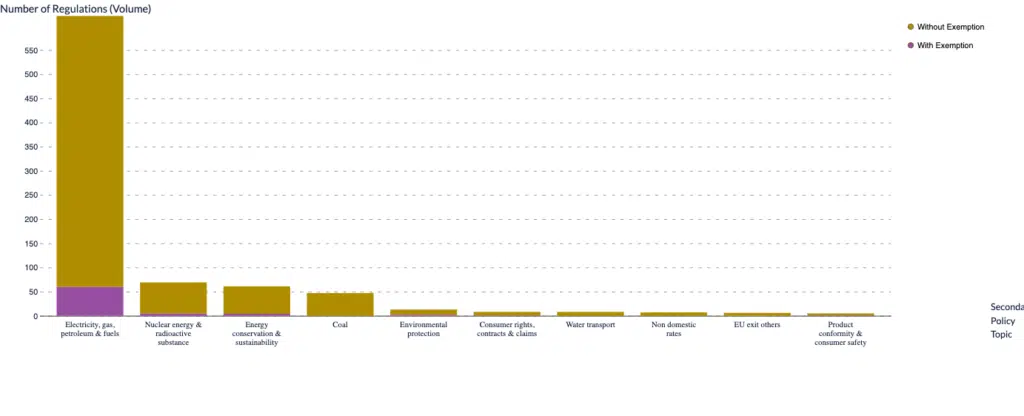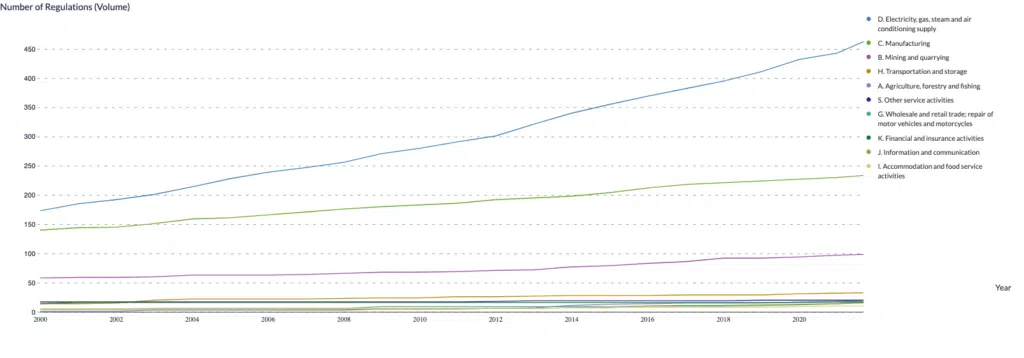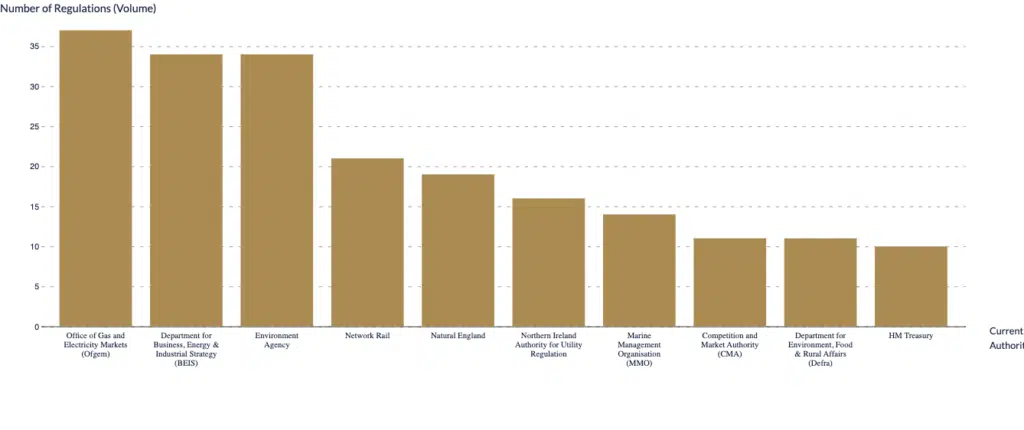
In today’s society, energy is everything. We rely on energy to keep the lights on, heat our homes, power our cars, and help fuel our economy. In Great Britain, as elsewhere, energy policy affects everything from unemployment and inflation to national security, international trade, and climate change. Needless to say, given its importance – and multifaceted complexity – producing regulations on energy is a major challenge for government regulators
Importance of energy to the UK economy
In the UK, energy plays a critical role in the economy, according to UK Energy In Brief 2022 published by the department for Business, Energy, and Industrial Strategy, energy sector is creating about 2.5 percent of GVA (Gross Value Added) and accounting for 175,000 in direct jobs, which constitutes 6.3 percent of overall industrial employment – and that’s not counting jobs indirectly related to the energy sector. In addition, 8 percent of total investment and over a quarter of industrial investment goes into the energy sector. Energy policy over the past few decades, but especially in recent years, has been shaped by a number of external factors, including climate change, the COVID-19 pandemic, and the war in Ukraine.
History of UK energy policy
Since 1980, climate change has loomed large as a major factor driving UK energy policy. According to UK Energy In Brief 2022: As a share of GVA, traditional fossil fuels have dropped dramatically since the 1980s. In the mid-1980s, oil and gas extraction contributed a little over 6 percent GVA; by 1990, it was just under 2 percent. Coal production, which always was a lower share of energy production, went from around 2 percent in 1980 to near zero in the 1990s. In terms of tonnes produced, Britain has cut coal from 92.8 million tonnes to 1.1 in 2021.
Meanwhile, reliance on renewable energy sources has steadily increased annually from 2000 to 2020, with wind and solar-based supply reaching an all-time high of 88.5 TWh in 2020 according to UK Energy In Brief 2022. In its new Net Zero Strategy, released in 2021, UK government authorities have reaffirmed their commitment to combating climate change by reducing carbon emissions and boosting renewable energy alternatives. According to McKinsey analysts, the plan holds the promise of economic opportunity, along with many challenges:
Beyond environmental benefits, the energy transition will mean the growth of significant value pools in renewables (in particular, offshore wind), grid, flexibility and operability services, and new downstream. Among industry players, there is excitement about the opportunities within the sector, and investors anticipate a new wave of growth. However, unlocking potential value will not be easy and will involve addressing issues regarding security of supply, costs, demand stimulation, and pressure on returns.
McKINSEY
The UK’s Current Energy Crisis
But climate change is not the only issue facing the UK energy policymakers and regulators. Britain is currently mired in an energy crisis driven by a number of factors, according to SEFE Energy. The current crisis can be traced back to 2021, after the Brexit process when the UK Emissions Trading Scheme assumed the role formerly held by the EU ETS, which led to “price volatility and market uncertainty,” according to SEFE Energy. Low winds speeds in the second quarter of the year diminished UK wind production, which had a disproportionate impact on the country as it relief more heavily on wind energy than the mainland. Then, the energy industry was hit by the post-COVID consumer demand in areas such as travel and hospitality, leading to soaring gas prices. In September alone gas prices shot up by 70 percent. For many energy supplier it was too much: by the close of the year, 28 companies went out of business, with an impact to a total of two million consumers.
Then, in February 2022, Russia’s war against Ukraine compounded Britain’s energy troubles by limiting the availability of gas on the international market. EU also levied a number of sanctions against Russia on oil, refined petroleum products, and coal, among other non-energy products, according to European Council and Councils of the EU. Russia in turn reduced the flow of gas through Nord Stream before eventually shutting it off, according to BBC.
Responding to the Energy Crisis
British authorities have responded to the energy crisis in several ways. In October 2022, Ofgem, the leading energy regulator in the UK (Ofgem stands for “the Office of Gas and Electricity Markets) launched the Energy Bill Relief Scheme, a form of a price cap, to aid businesses affected by rising prices. The next month, Ofgem, issued an annual price cap of £4,279 for consumers. The business relief policy was replaced by the “less generous” Energy Bills Discount Scheme, which could adversely affect many businesses in Britain. Ofgem has taken a number of other steps in response to the crisis including: addressing the entry of low-capital energy companies into the market and their use of customer credits; plans for a “a much tougher approach to financial regulation to ensure that companies have the right governance, risk management and appropriate finances behind them”; and changes in the price cap. Outside government agencies, there have also been calls for more robust regulation akin to the regulatory approach to the financial crisis in 2008, according to Financial Times.
The Economic Crisis
It’s worth noting that the UK’s energy crisis is unfolding alongside during a time of economic turbulence. According to Vox, last fall, the country was faced with a series of crises in the health of its currency, rising inflation, and the cost of living. Those problems were exacerbated by then-Prime Minister Liz Truss’ proposed tax cuts, which were blamed for plunging the country’s economy further into chaos. At one point, the British economy appeared to be heading for a severe recession. That fate has, at least for the moment, been averted but the country’s business community remains uneasy about the direction the economy is headed. According to a Reuters report:
With the economy still hobbled by high inflation and worries about a weak growth outlook, gross domestic product (GDP) increased by 0.1% between October and December after a preliminary estimate of no growth. … Despite the improvement, British economic output remained 0.6% below its level of late 2019, the only G7 economy not to have recovered from the COVID-19 pandemic.
Schomberg and Bruce
Against this economic backdrop, getting energy policy right is even more important: UK regulators have the responsibility for issuing regulations that alleviate, rather than add to the economic troubles facing consumers, small businesses, and the energy sector as a whole.
Energy regulation in the UK
Energy regulation topics
As shown in the below graph, the top 10 topics in UK Energy regulations are:
- Electricity, gas, petroleum, and fuels
- Nuclear energy and radioactive substances
- Energy, conservation & sustainability
- Coal
- Environmental protection
- Consumer rights, contracts & claims
- Water transport
- Non domestic rate
- EU exit
- Product conformity and consumer protection

Some government regulations provide exemptions for small businesses. The top three areas on the above list had significant exemptions for small businesses.
Energy regulations on different sectors over the past 20 years
Over the past two decades, in terms of the volume, most energy regulations have been focused on in order of most to least:
- Electricity, gas, steam and air conditioning supply
- Manufacturing
- Mining and quarrying
- Transportation and storageAgriculture, forestry, and fishing
- Other service activities
- Wholesale and retail trade; repair of motorcycle vehicles
- Financial and insurance activities
- Information and communication
- Accommodation and food service activities

The above graph shows the staggering growth of regulations in the top areas from 2000 to 2023. For example, by 2020, there were almost 450 regulations in total applying to electricity, gas, steam or air conditioning, up from approximately 175 in 200. Regulations in this category particularly seems to have accelerated upwards around 2012. Government rules in the next two areas, manufacturing and mining and quarrying have also seen a significant rise since 2000, but the increase has been steadier. The remaining sectors have remained almost flat over the past two decades, remaining under 50 regulations.
The UK’s Key Energy Regulators
The number of energy regulations is extensive; so is the array of government agencies involved, to one degree or another in issuing those regulations. Below are the key authorities, listed by volume of regulations, from the highest number to the lowest:
- Office of Gas and Electricity Markets (Ofgem)
- Department for Business, Energy, and Industrial Strategy (BEIS)
- Environment Agency
- Network Rail
- Natural England
- Northern Ireland Authority for Utility Regulations
- Marine Management Organization (MMO)
- Competition and Market Authority (CMA)
- Department for Environment, Food, and Rural Affairs (Defra)
- HM Treasury

As the above graph shows, ten UK agencies are actively involved in energy regulation. As might be expected, the top two agencies are those whose official charge is to regulate energy, Ofgem and BEIS, with over 30 regulations each. The Environment oversees also over 30 regulations, is also consistent with its role, as many environmental regulations involved energy. The rest of the authorities’ role in energy regulation drops off noticeably, though still remains high, between 15 and 20 regulations for about a third of them.
How Law Notion’s Reglytica application can help regulators
Given the complex and dynamic energy sector, along with the current energy and economic crisis, formulating and implementing regulations effectively is more important than ever. In order to produce effective regulations, government regulators must not only have access to reliable economic and regulatory data, they must also be able to accurately forecast the impact of any given regulation on consumers, businesses, and the sector as a whole. Law Notion’s web-based application, Reglytica, is designed to do just that.
Law Notion – Reglytica enables regulators to analyze a regulation from multiple angles, such as the sector as a whole, or from particular policy vantages points such as consumer protection or worker health and safety. Importantly, given the complex regulatory environment in which multiple agencies have a role to play, Law Notion – Reglytica allows policymakers to compare overlapping regulations to identify potential conflicts or redundancies. Another important element of analysis is to look at historical regulations in order to understand the cumulative effective of regulatory changes over time.
With better insights into the regulation landscape provided by Reglytica, policymakers can have a much more in-depth understanding of the regulations; combined with their field knowledge in regulating businesses and making a balance in the society, policymakers can then design better regulatory systems.
